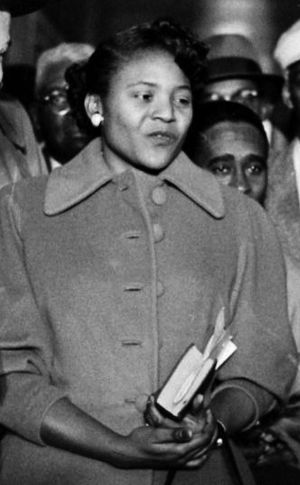Autherine Lucy
Autherine Juanita Lucy Foster (born October 5, 1929 in Shiloh, Marengo County; died March 1, 2022) was the first Black student to attend the University of Alabama, though only briefly, in February 1956.
Lucy graduated from Linden Academy in Marengo County in 1947, and went on to attend Selma University in Selma, and the all-black Miles College in Fairfield, where she graduated with a bachelor of arts in English in 1952.
Later in 1952, she decided to attend the University of Alabama as a graduate student but, knowing that admission would be difficult due to the University's admission policies, she and a friend, Polly Anne Myers, approached the National Association for the Advancement of Colored People (NAACP) for help. Thurgood Marshall, Constance Baker Motley, and Arthur Shores were assigned to be her attorneys. While they started preparing her case, she worked as a secretary. Court action began in July 1953.
On June 29, 1955, the NAACP secured a court order preventing the University from rejecting the admission applications of Lucy and her friend based upon their race. Days later, the court amended the order to apply to all other African-American students seeking admission. The Supreme Court of the United States upheld the decision on October 10, 1955. On February 3, 1956, Lucy enrolled as a graduate student in library science. Myers, however, had also been rejected for having borne a child out of wedlock. She subsequently withdrew her application.
LAt least four burning crosses were found in the days before her arrival on campus. Her presence was met by student riots and she had to be escorted to her classes by car and to shelter in windowless classrooms and in a tunnel connecting Bibb Graves Hall to the McLure Library. The police were called to restore order, but, after three days, the University suspended Lucy on the grounds that it could not provide a safe environment.
Lucy and her attorneys filed suit against the University to have the suspension overturned. However, this suit was not successful and was used as a justification for her permanent expulsion. University officials claimed that Lucy had slandered the university and they could not have her as a student. She married that year and moved with her husband to Texas. She returned to Alabama in 1974, residing in Bessemer and teaching at Hard Elementary School and Ensley High School.
The University of Alabama finally overturned her expulsion in 1980, and in 1992, she earned her Masters degree in Elementary Education from the University that she had applied to decades earlier. In 2010 the Autherine Lucy Clock Tower was dedicated at Malone-Hood Plaza, just north of Foster Auditorium. In 2017 the university erected a historic marker outside the College of Education honoring Lucy's important role in desegregating the institution. In 2019 she was awarded an honorary doctorate.
On February 3, 2022, the 66th anniversary of Lucy's first day of classes at Alabama, the Board of Trustees announced that her name would be added to Bibb Graves Hall, making it "Lucy-Graves Hall". The choice to pair her name with Graves' prompted an immediate backlash. John England Jr, a former trustee who chaired the committee on names, admitted that it had been difficult to weigh the merits of Graves' record as a supporter of education with his former position as a leader of the Montgomery Ku Klux Klan. He said that Foster's family had been consulted during the process. The Crimson White criticized the move as, "a cowardly compromise that presents the illusion of forward momentum while clinging to a racist past." During a special meeting on February 11, the Trustees changed their decision and voted unanimously to re-name the building "Autherine Lucy Hall".
Lucy attended the rededication. She died shortly afterward, in March 2022.
References
- "Autherine Lucy" (November 23, 2007) Wikipedia - accessed November 26, 2007
- "Foster, Autherine, Juanita Lucy (1929-)". Biographical profile at the Papers of Martin Luther King, Jr. website maintained by the King Center at Stanford University.
- Hicks, Tai (2003) "Autherine Lucy Foster returns to the schoolhouse door." DatelineAlabama.com
- Taylor, Drew (February 7, 2022) "‘Everybody can change’: Autherine Lucy discusses name added to Alabama hall alongside former KKK leader" CBS42.com
- Hauser, Christine (February 8, 2022) "An Alabama Building Honors a Klan Leader. Officials Are Adding a Black Student’s Name." The New York Times
- Diaz, Johnny (February 11, 2022) "University of Alabama Removes Klan Leader’s Name From Building." The New York Times
- Griesbach, Rebecca (March 2, 2022) "Autherine Lucy Foster, University of Alabama’s first Black student, dies." The Birmingham News
